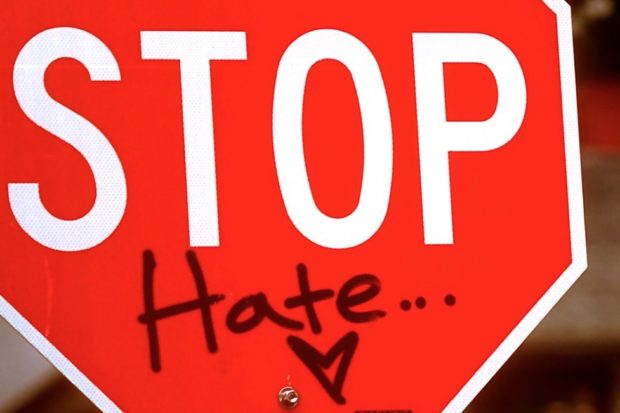

As a child, I knew what hate incidents and hate crimes felt like even though I didn’t know there were terms for them.
I knew that gut feeling—the fear and uncertainty. Was I over-exaggerating? Was I being sensitive? Would I make it worse if I responded? Would there be retaliation? Was it even worth the risk?
These fears and questions were part of why I rarely spoke up.
The other reason was: I did not know where to go.
My stepfather had been a cop in his youth. He often boasted with stories of corruption and self-indulgence at the dinner table. This helped foster fear and doubt in my mind. Like many minorities, it made me even more unsure of who to call when in need. How could I trust anyone in asking for help if they could be as selfish and cruel as him?
Moving to California, my mom was cut off from her family, her community and her support system.
Over time, we found new communities to be part of.
Neighbors, coworkers and friends from school. People like us, people going through similar experiences. They helped translate, provided support and eventually began telling us of organizations they had gone to.
My psychology professor recently said something I found unexpected. He said that current research suggests people struggling with mental health issues are more likely to recover in Third World countries than in First World countries. The reason he provided was a strong sense of community.
It made me really reflect. Sometimes we don’t ask for help because we don’t know how. Sometimes it’s because we don’t know who to ask.
This is why I am so thankful to the Community Alliance for inviting me to be part of the “Stop the Hate” campaign. The goal has been clear at each town hall it has held: to inform communities on resources and organizations that could provide them with help. To form stronger ties. To provide support.
We are stronger together. We are stronger informed.
The “Stop the Hate” campaign has provided funding to organizations meant to help victims of hate incidents and hate crimes. This is about creating a network of allyships and expanding both our communities and knowledge.
I live an hour away from Huron. Until the planning for the first town hall, (I am embarrassed to admit) I had no idea it even existed. I didn’t know their struggles and their need for a local high school.
Before writing my article about Gen Z, I had no clue Lindsay had elected a new mayor (I live a little under 30 minutes away). Sometimes in the hustle and bustle of daily life it’s easy to lose track of the world around us and the issues that matter—especially the local ones. Our phones and TVs are flooded with diversions and terribly stressful stories. It can get overwhelming.
It’s important to remember that change starts at home, within our communities, neighborhoods and homes. Change comes from becoming informed on the resources around us and the struggles local communities are facing.
This is vital, not only to help ourselves but also to offer help to those in need. If you know where to go and see someone experiencing a hate crime, you can send them exactly where they need to go for help.
Some of the organizations and groups that have participated in our town halls include the Fresno Center, the Department of Justice, the Council on American-Islamic Relations (CAIR) and the Dolores Huerta Foundation.
The Fresno Center, for example, has 20 programs where you can get an array of assistance such as immigration/citizenship resources or mental health services.
The Dolores Huerta Foundation is a San Joaquin Valley entity that provides much-needed support to nonprofits and individuals as well as educating and laying strong cultural foundations.
CAIR is a civil rights and advocacy nonprofit. It focuses on protecting the civil rights of American Muslims nationwide.
The Community Alliance is also working on creating a comprehensive, free and accessible online list of nonprofit organizations with the type of support/resources listed that they offer. This is part of our mission to continue informing our communities.
Sometimes it can be scary stepping out into the world and asking for help, especially if you don’t know who to ask. We hope that through our town halls, articles and projects we can provide those answers. We hope to provide the tools for victims to stand against hate and to encourage allies to step up when needed.
Asking for and offering help are the first steps toward justice.
Where To Go for Help
Dolores Huerta Foundation: doloreshuerta.org
The Fresno Center: fresnocenter.org
Council on American-Islamic Relations (CAIR): cair.com
